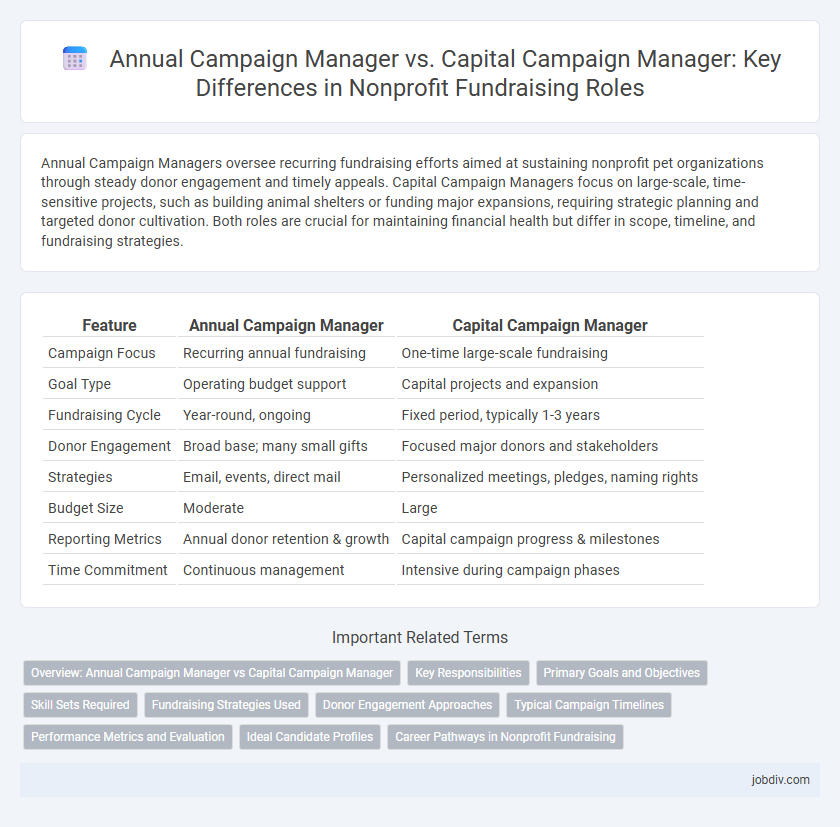Annual Campaign Managers oversee recurring fundraising efforts aimed at sustaining nonprofit pet organizations through steady donor engagement and timely appeals. Capital Campaign Managers focus on large-scale, time-sensitive projects, such as building animal shelters or funding major expansions, requiring strategic planning and targeted donor cultivation. Both roles are crucial for maintaining financial health but differ in scope, timeline, and fundraising strategies.
Table of Comparison
| Feature | Annual Campaign Manager | Capital Campaign Manager |
|---|---|---|
| Campaign Focus | Recurring annual fundraising | One-time large-scale fundraising |
| Goal Type | Operating budget support | Capital projects and expansion |
| Fundraising Cycle | Year-round, ongoing | Fixed period, typically 1-3 years |
| Donor Engagement | Broad base; many small gifts | Focused major donors and stakeholders |
| Strategies | Email, events, direct mail | Personalized meetings, pledges, naming rights |
| Budget Size | Moderate | Large |
| Reporting Metrics | Annual donor retention & growth | Capital campaign progress & milestones |
| Time Commitment | Continuous management | Intensive during campaign phases |
Overview: Annual Campaign Manager vs Capital Campaign Manager
An Annual Campaign Manager oversees recurring fundraising efforts, focusing on donor engagement and sustaining consistent revenue streams through yearly appeals and events. A Capital Campaign Manager drives one-time, large-scale fundraising initiatives aimed at financing specific projects like building expansions or endowments, requiring strategic planning and major gift cultivation. Both roles demand robust relationship management and data analysis skills, but differ significantly in campaign scope, duration, and financial targets.
Key Responsibilities
Annual Campaign Managers drive ongoing fundraising efforts by coordinating donor outreach, managing pledge renewals, and analyzing campaign performance metrics to sustain revenue streams. Capital Campaign Managers focus on securing major gifts for specific projects, overseeing feasibility studies, cultivating relationships with high-net-worth donors, and managing campaign timelines to meet targeted fundraising goals. Both roles require strategic planning, donor stewardship, and targeted communication to maximize donor engagement and campaign success.
Primary Goals and Objectives
Annual Campaign Managers focus on maximizing donor participation and securing recurring gifts to sustain ongoing operational budgets, prioritizing short-term funding targets and donor engagement metrics. Capital Campaign Managers aim to raise substantial, one-time funds dedicated to specific major projects such as building expansions or endowment funds, emphasizing long-term financial commitments and milestone-based progress tracking. Both roles require strategic donor communication but differ fundamentally in campaign scope, timeline, and fundraising goals.
Skill Sets Required
Annual Campaign Managers require expertise in donor relationship management, data analytics for tracking fundraising progress, and strong communication skills to craft compelling appeals that engage a broad audience. Capital Campaign Managers need advanced project management abilities, proficiency in major gift solicitation, and strategic planning skills to oversee multi-year fundraising efforts for large-scale capital projects. Both roles demand leadership, budgeting acumen, and experience with nonprofit fundraising software to effectively drive campaign success.
Fundraising Strategies Used
Annual Campaign Managers focus on donor retention and recurring gifts through direct mail, email appeals, and event fundraising to sustain year-round revenue streams. Capital Campaign Managers deploy targeted major gift solicitations, planned giving, and naming opportunities to raise substantial funds for specific projects or capital improvements. Both roles utilize segmented donor databases and personalized communication strategies to maximize fundraising effectiveness.
Donor Engagement Approaches
Annual Campaign Managers prioritize consistent donor communication through multi-channel outreach, emphasizing regular updates and impact stories to maintain donor loyalty. Capital Campaign Managers engage donors with personalized, high-stakes appeals and milestone celebrations that highlight transformational projects and long-term vision. Both roles utilize data-driven segmentation and stewardship strategies to deepen donor commitment and maximize fundraising outcomes.
Typical Campaign Timelines
Annual Campaign Managers typically oversee fundraising efforts that span one fiscal year, focusing on steady donor engagement and recurring contributions, with campaign timelines ranging from 6 to 12 months. Capital Campaign Managers handle intensive, goal-driven projects aimed at significant fundraising milestones, often extending over 12 to 36 months to accommodate planning, solicitation, and project completion phases. Understanding these typical timelines helps nonprofits allocate resources efficiently and tailor strategies to meet short-term operational needs or long-term capital goals.
Performance Metrics and Evaluation
Annual Campaign Managers focus on metrics such as donor retention rates, total funds raised within a fiscal year, and average gift size to measure campaign effectiveness. Capital Campaign Managers prioritize long-term performance indicators like pledged amounts versus collected funds, progress toward campaign goals, and engagement levels of major donors and stakeholders. Both roles require detailed evaluation of donor demographics and donation patterns to optimize fundraising strategies and maximize impact.
Ideal Candidate Profiles
The ideal Annual Campaign Manager excels in donor engagement, data analysis, and multi-channel communication to sustain consistent fundraising cycles, typically requiring strong skills in CRM software and event coordination. In contrast, the perfect Capital Campaign Manager specializes in large-scale project fundraising, strategic planning, and major gift solicitation, often possessing extensive experience in campaign leadership and stakeholder management. Both roles demand exceptional relationship-building abilities but differ significantly in campaign scope and donor interaction intensity.
Career Pathways in Nonprofit Fundraising
Annual Campaign Managers specialize in driving recurring donor engagement through strategic communication and event coordination to meet yearly fundraising goals. Capital Campaign Managers lead large-scale, time-bound projects focused on major gift acquisition and infrastructure funding, requiring advanced skills in donor cultivation and project management. Career advancement in nonprofit fundraising often begins with annual campaign experience, progressing toward capital campaign leadership roles that demand greater expertise and stakeholder collaboration.
Annual Campaign Manager vs Capital Campaign Manager Infographic

 jobdiv.com
jobdiv.com